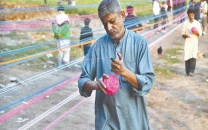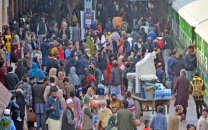Cross border movements: SC urges security agencies to keep strict watch
Seeks complete record of all the missing persons who are detained in 11 internment centres

PHOTO: EXPRESS
“The agencies must ensure strict surveillance of the persons who are crossing the western border from either side otherwise there will be a grinding halt [to such movement],” Justice Ejaz Afzal Khan noted on Monday while heading a three-judge bench, hearing missing persons cases.
The observation came after a law officer claimed that most of the missing persons had fled to Afghanistan to join ‘Jihad’. The bench while showing concern over this trend said it is a duty of the state agencies to keep an eye on such people who are crossing the border from either side.
The bench also sought complete record of all the missing persons who are detained in internment centres. Presently 11 such centres are functioning in which hundreds of missing persons are detained.
“You are required to tell us under what law and charge these people are detained in the internment centres?” Justice Ejaz Afzal Khan asked Additional Attorney General (AAG) Sajid Ilyas Bhatti.
The judge also observed that it is the duty of state to know whereabouts of the missing persons.
When the Inquiry Commission on Enforced Disappearances revealed that there is a group of people, who do not fall under the category of missing persons, Justice Khan asked AAG what is the evidence that these individuals do not fall under the category. “Families are the aggrieved [parties]. Where have these persons gone? And if the state cannot tell about their whereabouts then who can?” he adds.
Judges offered closed-door briefing on missing persons
During the hearing, when Inamur Rehim advocate told the bench that the authorities are not allowing suspects facing trial in military courts to engage counsels, the AAGP said most of the suspects have refused to contest the charges framed against them and have happily admitted their offences.
Bhatti claimed that even they plead guilty but the military authorities ensure their transparent trial by giving them counsels. Brother of an internee Usama appeared before the bench and said he had met with his brother in Internment Centre last year. He said his brother had revealed that 105 internees have already died in the detention as they are being treated badly.
The bench also sought the federal government’s policy regarding the compensation to the heirs of missing persons. The court said it is the duty of the state to provide compensation to the families of victims of enforced disappearance.
Tariq Asad advocate requested the SC to summon heads of the Inter-Services Intelligence (ISI) and Military Intelligence (MI) in chamber to answer on the issue. Rights activist Amina Janjua also appeared for court’s assistance and furnished progress on missing persons whose cases were listed for hearing.
She told the bench about an instance of enforced disappearance in which a case was registered against a police official, who later got acquittal from the court. The bench asked Khyber Pkhtunkhwa (K-P) government whether they had filed any appeal against his acquittal.
Inquiry Commission on Enforced Disappearance while submitting a report revealed that the commission had recommended the defence and interior ministries for the registration of a case against military officials, who were allegedly involved in kidnapping of Naveedur Rehman and Nasim Iqbal.
The report said 1,710 cases are still pending before the commission led by Justice (retired) Javed Iqbal. It said 125 fresh cases have also been received by the commission during the month of March while 55 cases were disposed of last month.
“The commission has so far received 4,929 cases while it has disposed of 3,164 matters,” it said.



















COMMENTS
Comments are moderated and generally will be posted if they are on-topic and not abusive.
For more information, please see our Comments FAQ